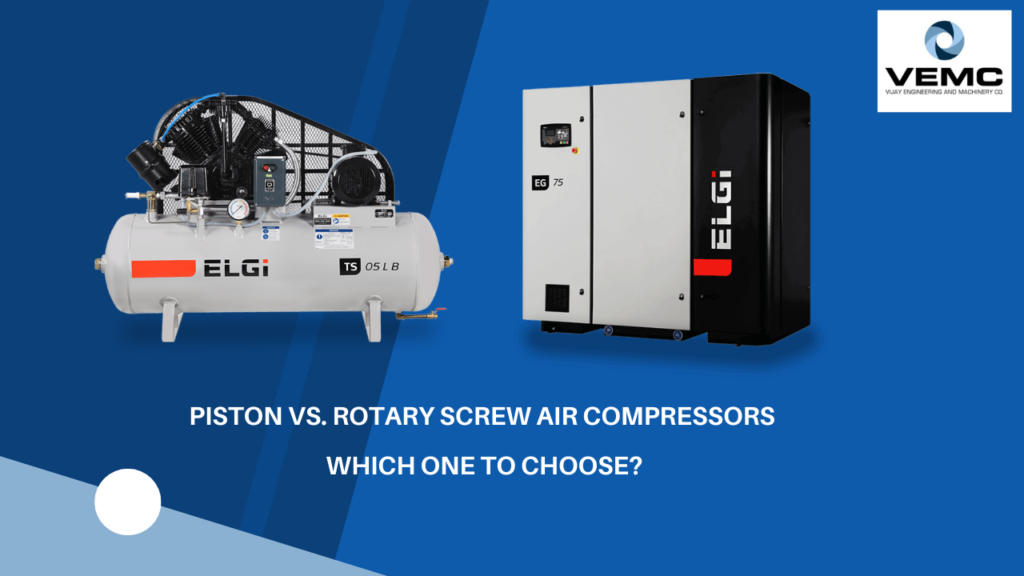
Air compressors have diverse applications for a wide range of businesses. Two of the most popular and widely used compressors are piston and rotary screw compressors.
Piston, also known as reciprocating compressors, find maximum use in the automotive service industry such as gas stations, tire stores, and general service shops, due to their price and availability. However, rotary screw compressors can be a suitable alternative as they offer better performance and require less space.
In this blog, we will understand the various points of difference between the two to help you choose the right one for your business.
Duty Cycle and Flow
Duty cycle is the time (calculated in percentage) a compressor can operate for, without getting overheated or causing wear. The allowable duty cycle for most piston compressors is 60-70%. Most piston compressors are oversized to allow space for the compressor to shut down and cool off due to the high temperatures. This may cause capacity problems during peak operating hours.
Modern rotary screw compressors, on the other hand, have in-built aftercoolers with huge surface area and robust fans to bring down the air temperature leaving the compressor.
Oil Carry-over
When pistons, cylinders, valves, and rings experience wear and tear, the quantity of air goes down. This causes more lubricating oil to seep through the piping into the usable parts. This is known as carry-over.
Piston compressors usually pass more oil than rotary screw compressors. Rotary screw compressors experience lesser oil seepage in comparison because the rotors don’t come in contact with each other and hence, don’t wear. Moreover, the compressor fluid also acts as non-wearing sealant that’s captured, filtered, cooled, and recirculated.
Energy Efficiency
For service industries that use compressors as large as 30 hp, energy efficiency becomes an essential factor to save electricity costs.
Piston compressors usually deliver 3-4 cfm per hp whereas rotary compressors deliver 4-5 cfm per hp. This shows that rotary compressors deliver more air per unit of input energy.
Maintenance
The maintenance of piston compressors is more expensive than screw compressors because the frequency of maintenance and the number of spares is significantly higher for piston compressors. However, the advantage is that any semi-skilled technician or worker will be able to perform the maintenance service.
Noise Levels and Vibration
Traditional piston compressors produce a lot of noise and vibration. As a result, they are mostly placed in separate rooms or outside. However, the immediate ecosystem directly affects a compressor. For example, a hot and humid room will increase the compressor temperature, reduce its shelf life and make it difficult to remove moisture and oil from compressed air.
Rotary compressors cause lesser noise and vibration. They also don’t need to be kept in separate rooms or sealed to the floor, offering more flexibility with their location i.e., well-ventilated areas.
For assistance with deciding on the air compressor that suits your needs the best, please contact us on +919819907445. We would be delighted to help you find the best product or service based on your exact requirements. As one of the leading ELGi air compressor dealers, VEMC provides a comprehensive array of seamless products and services to its clients. A pioneer in electromechanical engineering products, allied equipment, and services in the field, we are also ISO 9001:2015 certified.

